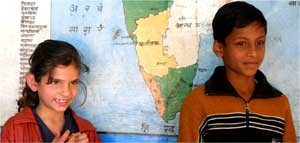Article and Image Courtesy : One World South Asia
Author : Madhusmita Hazarika

Monica Kumawat and Gopal Verma of the Ramadevi Malchand Bagri Upper Primary School are among the 32,000 students Akshaya Patra serves daily in Nathwar
It is a similar line of thought that guides the work of Akshaya Patra Foundation, an NGO in India that has been flag-bearing the cause of hunger amelioration by feeding children in government-run schools across the country.
Commencing in the year 2000, Akshaya Patra (AP) today anchors the world’s largest NGO-run mid day meal programme, feeding 1.3 million children every day in 8,000 schools, across 18 locations in eight states of India.
The meals are cooked in Akshaya Patra-owned kitchens and distributed through their trademark Blue Buses to reach the schools in time for kids to have a hot lunch. The rationale is simple – these schools mostly have students from economically backward sections, and the free meals through the Akshaya Patra programme are usually the only proper ones they get to have in a day.
This is not only an incentive for the kids to come to school; it also has other fringe benefits in terms of better nutrition and health for children, and social parity in an inter-dining classroom set-up.
Model programme
No child in India shall be deprived of education because of hunger,” is Akshaya Patra’s vision.
Succinct as it sounds, it however takes a lot of work in the background to realise this dream. To start with, it takes a set of 16 kitchens with the latest equipment, and the science of cooking quick huge meals, which form the backbone of the Akshaya Patra effort across India. This is driven by a subsidy-partnership with the Government, and donation support from individuals and corporates, which has kept the programme moving successfully through the 11 years of its operation.
The AP kitchens are modeled in two formats – a centralised format that prepares food for all schools of a particular location in one kitchen only, and a decentralised model in which the cooking activities take place in areas close to the school itself. There are presently 14 centralised and two decentralised kitchens run by the NGO.